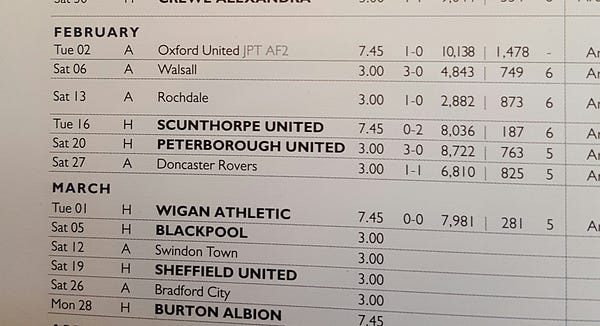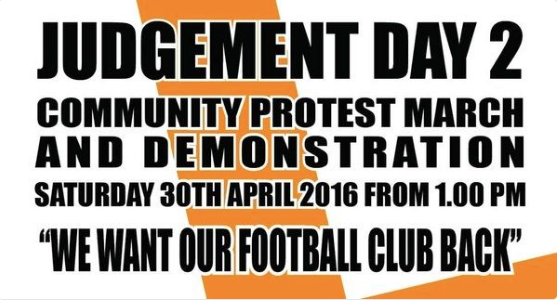Football attendance figures are inaccurate and don’t tell the whole story
General ·It can be useful to know how many people attend a football match but the official figures are not accurate. Blackpool fans have been collecting data and working out more accurate attendance figures for their team. They hope it will help them oust the football club’s owners and help a fan-owned club to emerge. The footballing authorities should encourage clubs to publish the more accurate data that they already collect. In the meantime the technique could help fans of other clubs.
Lots of people want to know attendance figures but it is not easy to get hold of accurate data
The police, and other services need to know the attendance figures so they can help maintain safety or in case of an emergency. The home team need to know to keep track of finances, look after health and safety and make sure there’s enough pies and bovril available. The away team might need to know the number so that they get a share of gate receipts. The local council might want to know so they can plan transport or understand the number of visitors coming to their town every other week. The football authorities want the numbers so they can proclaim how important the sport is. Fans want to know the figures too.
 A snippet from the Millwall-Blackpool programme from 5th March 2016. Attendance figures are in the 6th column.
A snippet from the Millwall-Blackpool programme from 5th March 2016. Attendance figures are in the 6th column.
An attendance figure might be announced at a match. Printed in a programme. Published in a match report. Gathered on football stats websites with information about clubs, leagues or across the globe. The attendance figure you see in these places is typically wrong.
A video of a Blackpool game before kickoff by a reporter at the local paper. The official attendance figure was 7,719.
In England the rules of the premier league say that attendance figures that are publicly reported should be the number of tickets that are issued or sold. Not the number of people who actually attend. (I understand the football league rules say the same, although I couldn’t find the precise clause.)
The actual attendance figure can be quite different to the number of tickets that are issued or sold. Season ticket holders may not turn up for a midweek game. Complimentary, i.e. free, tickets could be issued but not used. People might even walk out in the middle of a match as a protest.
In the case of my club, Blackpool FC, fans wanted to know more accurate figures due to their own protests.
The Oystons, Blackpool, bids for the club and a boycott
The owners of Blackpool football club, the Oyston family, have loaned millions of pounds from the club to other companies, taken legal action against fans, taunted them and abused them by text. Unsurprisingly most Blackpool fans want the Oystons to leave.
In 2015 there were two bids to buy the club. One from an unnamed consortium of bidders. The other from the democratically run Blackpool Supporters Trust. The second bid would have created a fan-owned club. Both bids were rejected. Until the Oystons go many fans have chosen to boycott the club.
Without accurate attendance figures it’s tricky to understand the impact of the boycott. Whilst the fans can speak eloquently of the damage the Oystons have done to them it might be tricky for a bidder, or the local council, to understand the damage that has been done to the club and town due to the dreadful mismanagement of the Oystons.
Crowdsourcing better figures
So, using four people and a couple of hours of effort per game, we worked out better attendance figures.
 254 people in Blocks D and E during the Blackpool-Coventry game.
254 people in Blocks D and E during the Blackpool-Coventry game.
Two people in the ground took pictures of every block. Two other people then used a fairly simple and manually intensive, but effective, technique to count the number of objects in a photo. A small percentage, 5%, was then added to cater for some people not being in their seats at the time of the pictures.
The actual attendances for three home games were as follows:
- Blackpool v Shrewsbury (February 13): official figure 6,873 (including 790 away fans), revised crowd count 4,289— that’s 62% or 2,584 less than the official figure.
, CC-BY-2.0](https://cdn-images-1.medium.com/max/600/1*w28G161efPF2fnawOjLJJw.jpeg) Blocks D and E during a game at Bloomfield Road in 2006. Picture by Matthew Wilkisnon, CC-BY-2.0
Blocks D and E during a game at Bloomfield Road in 2006. Picture by Matthew Wilkisnon, CC-BY-2.0
- Blackpool v Bradford (February 27): official figure: 8,780 (including 3,063 away fans), revised crowd count 6,100 — that’s 69% or 2,680 less than the official figure.
- Blackpool v Coventry (March 12): official figure 8,869 (including 3,000 away fans), revised crowd count 5,845 — that’s 66% or 3,024 less than the official figure.
Before the boycott the home stands were full. As the Blackpool Supporters Trust say:
Blackpool FC states that there are currently 4,600 season ticket holders. These accurate crowd counts would suggest that over half of the season ticket holders are already boycotting home matches.
Undoubtedly this will have serious implications for next season — people not using tickets they have already paid for are unlikely to purchase new ones.
The Oystons are destroying Blackpool football club.
Data helps us make better decisions
All of the turnstiles at Blackpool, like many other clubs, have a system that scans tickets on entry. The club’s owners have access to more accurate data than they publish. We have to hope that all football clubs are sharing this accurate data with each other, with local councils and with the emergency services. Perhaps as well as calling for more transparent publication of data to stop abuses of power at Fifa the footballing authorities should ask all clubs to publish as open data both the real attendance figures as well as the number of tickets sold. It will help lots of people make better decisions. In the meantime if fans of other clubs want help in working out more accurate attendance figures then get in touch.
For Blackpool fans though the immediate decision is the choice they are making about whether or not to support the owners by spending money and time going to their football club. I’ve made my choice. I won’t go back. I hope that my boycott will help persuade the Oystons to go.

I will be joining a community march and demonstration organised by the Blackpool Supporters Trust and the Tangerine Knights on Saturday April 30. Blackpool fans are hoping to get 10,000 people to come along.
It doesn’t matter if you’re a Blackpool fan, or even a fan of football. The issues at Blackpool go beyond football. They affect many parts of the town and include concerns about transparency and accountability in the local council. What matters is that you care about people and communities and want to make things better.
Why not join us and stand up for a community fighting to get their football club back?